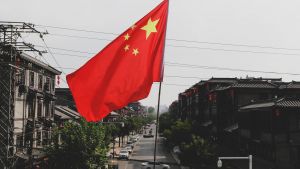Can China Rise Peacefully?
About This Event
Continued Chinese growth puts it on a collision course with its neighbors and, ultimately, with the United States, John Mearsheimer told The Chicago Council on a Tuesday evening.
Mearsheimer, a political scientist at the University of Chicago and co-director of its Program on International Security Policy, is the leader of the realist school of international relations. Controversial and widely quoted, he teaches that great nations live in a Hobbesian world that dooms them to conflict.
So it is with the rise of China, Mearsheimer told a crowd of 250 in his first Council speech since 2007. His thesis:
“Can China grow peacefully? The answer is no.”
Mearsheimer’s analysis grows directly from his realist theory of foreign relations, which he conceded “leads to a pretty brutal, pretty atavistic world.” He made it clear that he was talking as a theorist, predicting an unknowable future within the framework of his theory.
This theory accounted for about 75 percent of global relations, he said. “Given the bleak story I tell, let’s hope that this case regarding the rise of China is part of the 25 percent.”
Mearsheimer’s basic thesis was laid out in his best-known book, The Tragedy of Great Power Politics, published in 2001 and just republished with a new chapter, “Can China Rise Peacefully?”
Much simplified, his thesis goes like this:
All nation-states live in an “anarchic system.” This means that no higher authority controls them, not even the United Nations. In addition, all nations have offensive military capacity: great powers have a mighty offensive capacity.
But while we can know other nations’ capacities, we can never know their intentions: “you can’t get inside their heads.” This is frightening, because the principal goal of each state is to survive, and it logically fears that it may “be living next to a state with a lot of capability and malign intentions.”
Realism teaches that it’s every nation for itself. In the end, no nation can depend on anyone else. So “the best way to survive is to be the most powerful.”
Or, as he put it, “to be the biggest, baddest dude on the block.”
Any nation’s ideal, Mearsheimer said, is “regional hegemony.” This means absolute control of one’s region. The US is the only “regional hegemon” in history, because it faces absolutely no challenge in the Western Hemisphere.
No nation–not even the US–can be a global hegemon, so it worries about global challenges. Especially, it worries that another nation might become a “regional hegemon”–in particular, that China might dominate Asia the way we dominate the Americas.
Why should the US fear this? Because, he said, regional hegemony gives a country “freedom to roam.” The US can project power around the globe without worrying about its own region, “which is why we run around the world doing foolish things.”
If both China and the US were free to roam, they would roam into conflict with each other–in the Persian Gulf, for instance.
“We don’t want China to be free to roam,” he said. “We want them pinned down in their backyard.”
This is where China’s future meets Mearsheimer’s theory.
China, like all great powers, wants to dominate its region, to be a “regional hegemon.” To this end, China “won’t be happy about us running up and down their coast. They’re going to want the Americans out of there.”
This is no more than China’s application of America’s Monroe Doctrine to its own neighborhood, of a rising China behaving just as a rising America did.
“China will imitate the United States,” he said. “The same logic for us applies to them. They’re going to try to push us out, and I don’t blame them.”
The United States opposes this, because it wants no such “peer competitor.” This, he said, explains President Obama’s “pivot to Asia.” Washington already is forming “balancing coalitions” among China’s neighbors to hem it in.
“The United States is not a threat to Asia,” he said, “but China is a threat to Asia,” so some of China’s neighbors–South Korea, India, Japan–have joined America’s balancing coalition. This explains why “Japan and India are beginning to play kissy-face with each other.”
To Washington, this is a defensive measure against a rising China, Mearsheimer said. To Beijing, it’s “encirclement.” These differing perceptions are a potential source of conflict in themselves.
Since this balancing coalition depends on our allies’ confidence that we will defend them, “credibility and reputation really matter.”
A potential flashpoint could be the uninhabited islands–Senkaku in Japanese, Diaoyu in Chinese–claimed by both nations. “If China and Japan start shooting over the islands,” he asked, “what do we do?”
If we tried to arbitrate a ceasefire, he said, Japan would accuse us of breaking our obligations to Tokyo and, in defense, might develop its own nuclear weapons. But if we sided with Japan, we could find ourselves at war with China.
“We have a real interest in making sure that a shooting war doesn’t break out,” he said.
Event summary written by Richard C. Longworth.
